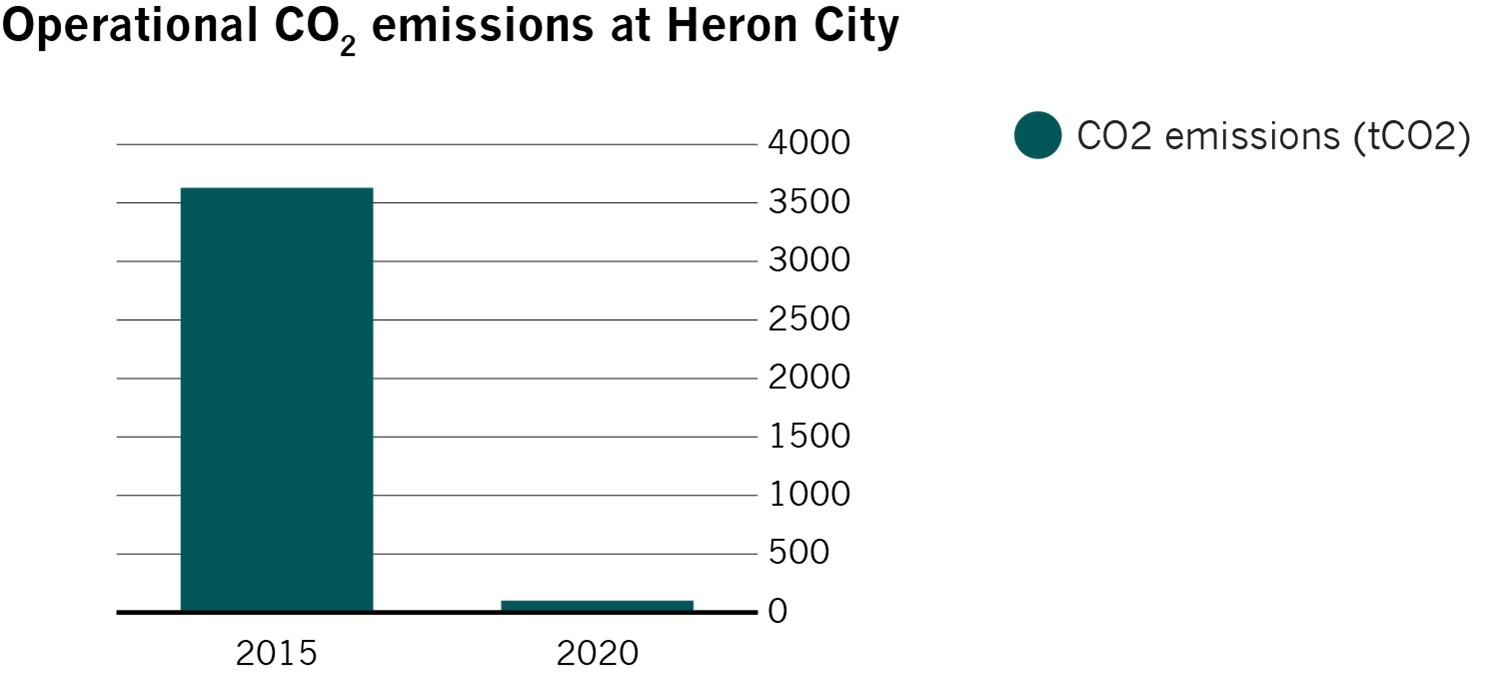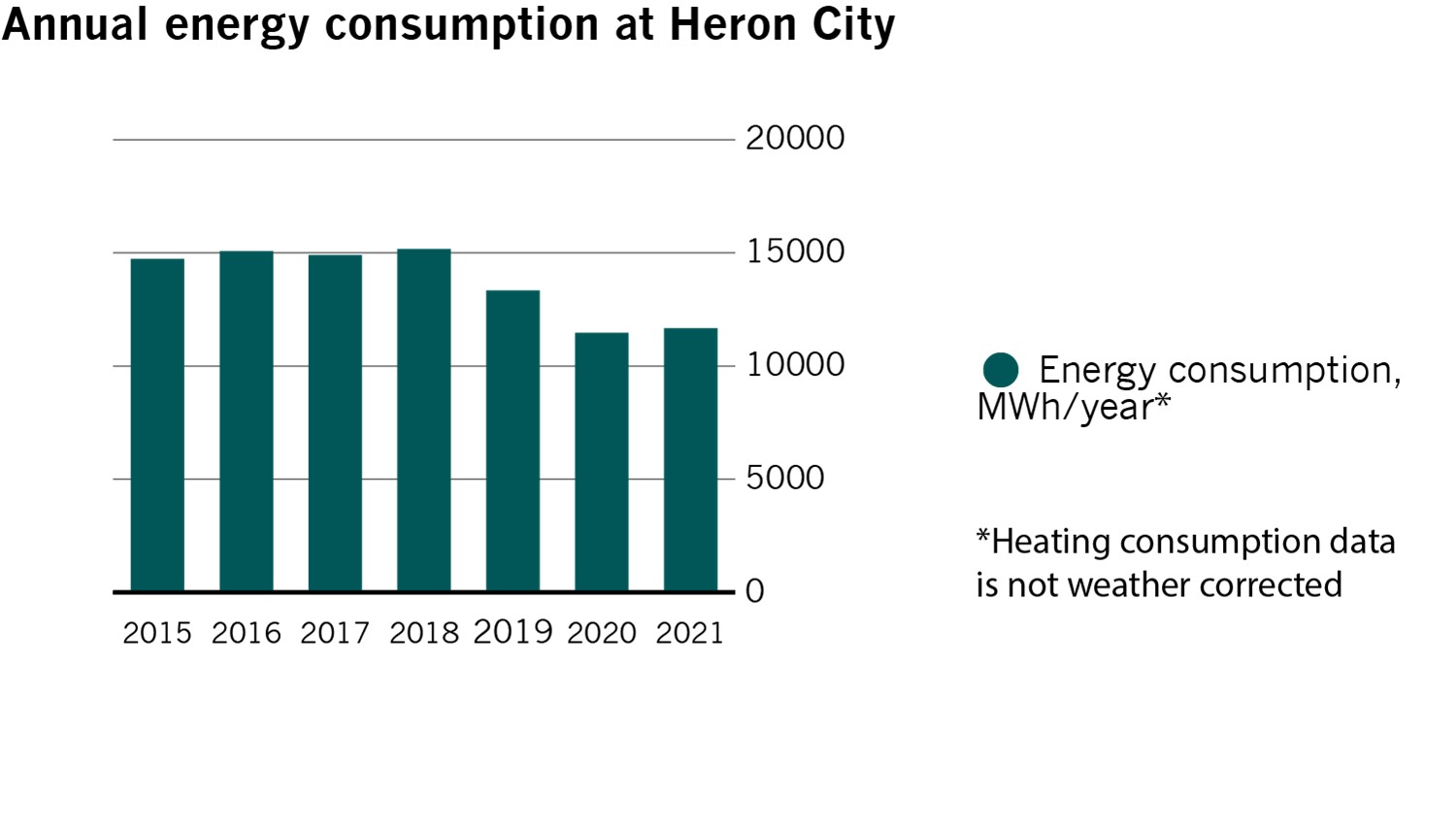01/04/2022
Real estate, such as office and residential buildings, shopping centres and warehouses, hold huge opportunities for sustainable transformations. Several actions have been taken to improve the liveability of the space and its value to the surrounding communities. Conscious and calculated improvements pushed this property to the next level and showed us once more, how green transitions drive profitability.
CapMan Nordic Real Estate Fund acquired Heron City, a landmark retail centre located in Kungens Kurva, 15 minutes from Stockholm city centre, together with Cavendo and Varma in 2016. Kungens Kurva is the busiest retail area in the Nordics and Heron City amassed around 7 million annual visitors.
Properties such as shopping centres have significant impacts on their surrounding environments and local communities. They offer locals and other visitors places to meet, make purchases, and enjoy their free time while offering companies places to establish and grow businesses. They also consume a lot of energy, water and generate for example a lot of waste and light pollution. Buildings in general contribute nearly 40%1 of global carbon emissions mainly through their often-high energy consumption and embodied carbon in construction materials.
“The achieved reduction of energy usage is the result of conscious and calculated improvements on several fronts”
Per Tängerstad, Partner at CapMan Real Estate.
During our ownership period, the Heron City property has decreased its annual energy consumption by an impressive 22% and reduced its operational CO2 emissions by 97% through switching to 100% renewable electricity consumption and to district heating from 99% renewable and recycled fuels.
At CapMan Real Estate, we are setting GHG emission reduction targets as well as targets to reduce the water consumption of our assets, increase the nr of sustainable building certifications, increase the number of green leases (for new larger leases), engage tenants in social and environmental matters and improve tenant satisfaction.
Significant reduction of energy usage and CO2 emissions
On the path towards net zero emissions, reduction of energy usage is key. Since CapMan Real Estate acquired Heron City, the 49,400 sqm shopping centre has decreased its annual energy usage with over 3 GWh2, amounting to a reduction of 22% and equivalent of the annual energy usage approx. 150 single houses in Sweden3. The operational CO2 emissions have decreased by 97% in 2020 compared to 2015. The reduction is due to switching to renewable electricity.


Improved monitoring and steering
At Heron City we performed technical improvements to develop our energy monitoring and steering. These improvements included e.g., tenant-controlled ventilation, repairing bearings, and replacing fans. We also reviewed our energy use to reduce our exposure. These actions allowed us to better control our energy usage, to be able to optimize and lower it and made us better prepared for market changes such as rising energy prices.
Switch to 100% renewable electricity
We switched our energy providers at Heron City and started using 100% renewable electricity, mainly hydro power, and 100% district heating, from which 99%4 is from renewable and recycled fuels.
Also, our electricity provider not only produces green energy, but also invests back in our environment by initiatives such as the rehabilitation of the historically significant nature and fishing areas in Harmånger, an area which has previously been damaged but is now being restored.
Consumer experience and community
At CapMan Real Estate we aim to create liveable spaces. Places where people can meet, connect, interact, establish, and develop businesses. We do this by collecting feedback and making improvements based on what we learn. We also aim to have a positive impact in the communities we invest and look for opportunities to do so.

At Heron City we performed the following actions:
- Charging stations installed: We installed altogether 28 charging stations for electric cars offering 11kW each, encouraging and supporting usage of more sustainable transport methods.
- Escalators renewed: We renewed all escalators in Heron City. The new escalators go into “sleeping mode” when not in use, making them more energy efficient.
- Waste-to-biogas: We run a program among our tenants aiming to improve the fractioning of waste. As part of the program, we installed a food waste collection unit where all restaurants sort out their food waste, which is then compressed and shipped off to be used in bio-gas production.
Conscious efforts create results
All in all, CapMan Real Estate has invested over SEK 60 million in tenant improvements and energy saving upgrades for the property. Our investments have taken us closer to our sustainability targets and resulted in concrete savings which are expected to continue going forward.
Looking at the UN Sustainable Development Goals (SDG) we have made developments regarding:
- SDG 7 Affordable and clean energy: improved energy efficiency through 22% reduction of annual energy usage**.
- SDG 11 Sustainable cities and communities: contribution to inclusive and sustainable urbanisation through investing in electric charging stations and through developing the shopping as a vibrant meeting point for locals.
As a result of the significant environmental improvements made, the property also received BREEAM In-Use certification Good rating at the start of 2022.
By investing in the sustainable transformation of Heron City we have been able to future proof and solidify it as a vital meeting point in the area.
1) Source: https://www.unep.org/news-and-stories/press-release/building-sector-emissions-hit-record-high-low-carbon-pandemic
2) Calculated based on data of total energy consumption in 2015 and 2020 including consumption of tenants. Heating consumption data is not weather corrected.
3) Source: Swedish Energy Agency (Energimyndigheten) estimates that detached houses consume approx. 20,000 kWh per year on average
4) 99% of district heating purchased in 2021 is produced from renewable sources and recycled fuels. Read more on: https://sfab.se/aktuellt/2022/99-fornybara-och-atervunna-branslen-2021/
